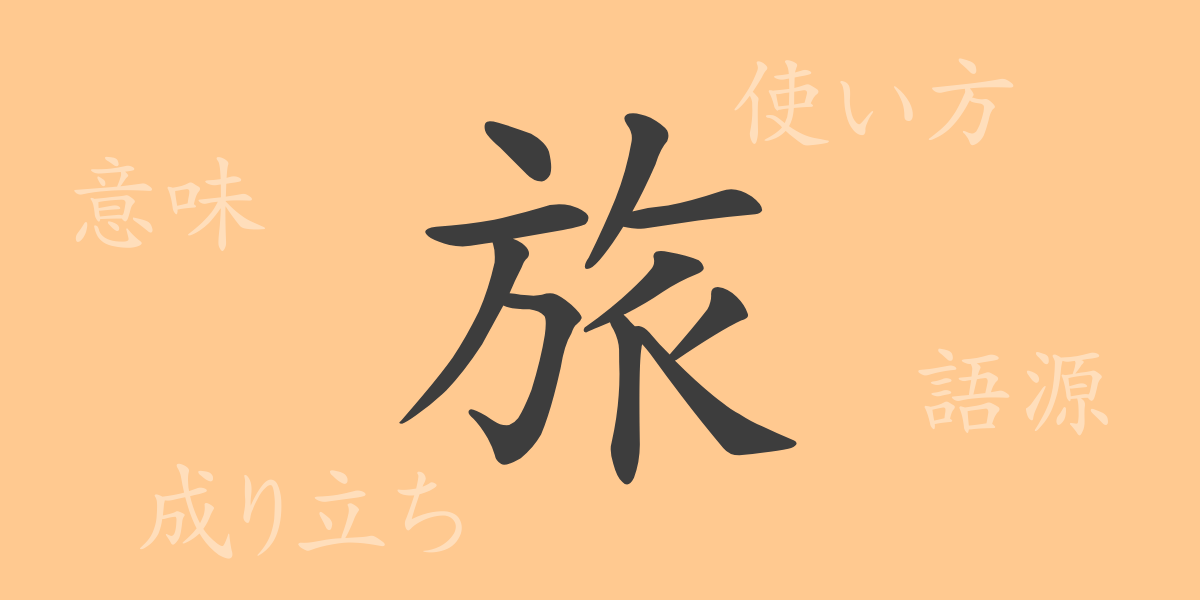The single character “旅” (たび, tabi) holds a power that transcends history and moves people’s hearts. A journey is more than just moving from one place to another; it is an experience that profoundly impacts our lives through new discoveries, personal growth, and encounters with cultures and people. In this article, we explore the deep world of the commonly used Japanese kanji “旅” (たび, tabi), uncovering its etymology, modern meanings, usage, and even idiomatic expressions and proverbs related to travel.
The Origin of “旅” (たび, tabi)
The kanji “旅” (たび, tabi) can trace its origins back to ancient Chinese bronze inscriptions. Originally, it had a form with “側” (そく, soku) on the left side, symbolizing a person walking with a sword. This imagery represented people traveling far distances, essentially capturing the essence of “journey.” Over time, it was simplified to its current form, yet it continues to serve as an ideogram that embodies the essence of travel.
Meaning and Usage of “旅” (たび, tabi)
In modern Japanese, “旅” (たび, tabi) refers to a long journey involving geographical movement. Used in various contexts like travel (旅行, りょこう, ryokou), departure (旅立ち, たびだち, tabidachi), and journey (旅路, たびじ, tabiji), this kanji often symbolizes new experiences, learning, and growth opportunities beyond merely changing locations. Additionally, it is used metaphorically to represent life’s journey (人生の旅, じんせいのたび, jinsei no tabi) or the journey of knowledge (知識の旅, ちしきのたび, chishiki no tabi), highlighting significant milestones or personal growth.
Reading, Stroke Count, and Radical of “旅” (たび, tabi)
Understanding the readings and components of the kanji “旅” (たび, tabi) can deepen your comprehension.
- Reading: It is read as “リョ” (りょ, ryo) in the on’yomi (音読み, おんよみ) reading, and “たび” (たび, tabi) in the kun’yomi (訓読み, くんよみ) reading.
- Stroke Count: It consists of 11 strokes in total.
- Radical: The radical is “ちまた” (ちまた, chimata), also known as “しんにょう” (しんにょう, shinnyou).
Idioms, Phrases, and Proverbs Using “旅” (たび, tabi)
There are many idioms, phrases, and proverbs in Japanese that include “旅” (たび, tabi), reflecting its diverse aspects.
- 旅立ち (たびだち, tabidachi): Setting off to a new place or beginning a new life.
- 旅路 (たびじ, tabiji): The journey or the path taken during travel.
- 旅心 (たびごころ, tabigokoro): The desire or mindset to travel.
- 旅情 (りょじょう, ryojou): The emotions or atmosphere felt during travel.
- 旅の恥はかき捨て (たびのはじはかきすて, tabi no haji wa kakisute): The idea that one should not worry about mistakes or embarrassments made while traveling, as they can be forgotten.
Summary of “旅” (たび, tabi)
The kanji “旅” (たび, tabi) symbolizes the adventures, changes, and growth that people experience. From its etymology to its modern meanings and usage, and even the idioms and proverbs, this single character holds many stories and lessons. In our lives, travel is not just about moving from one place to another; it is an opportunity to discover a new self and broaden our horizons. We hope this article helps deepen your understanding of “旅” (たび, tabi) and enriches your perspective on travel.

























